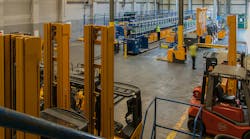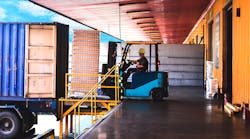Those are some of the things MH&L's Editorial Advisory Board judges take into account when choosing which of all the innovators we cover every year deserve the honor of an award in recognition of their efforts. Expecting a panel of judges like ours to deliver a list of clear-cut winners from among all the case studies we publish seems optimistic at best and foolish at worst. I've been both of those things many times in my life, so I'm not afraid to be either one at least one more time every year when asking our board members to pick their favorites from among the MAKE, STORE, MOVE and COMPETE categories.
This year my optimism paid off, because our judges were amazingly consistent in picking the stories they felt best showcased a culture of innovation. Our coverage highlights those stories and includes the judges' comments.
I couldn't let the runners-up go unacknowledged, however. After all, if their accomplishments merited space in MH&L, they deserve an end-of-year acknowledgment. Besides, the judges couldn't resist sharing their kudos with them—so I'll share them with you.
Lipari Foods, a family-run wholesale distributor we featured in June, serves a wide range of customers—from big chains to small convenience stores. It decided to adopt a single hands-free device supporting both voice and scanning in its fulfillment operations to improve picking efficiency. Their innovation wasn't in the device itself, but choosing it to escape the "that's the way we've always done things" trap.
"The main differentiator at Lipari was the fact that they were venturing into a whole new channel, which requires a different business model," says Thom MacLean. "The move required them to break old paradigms in favor of expanding their business. This is perhaps the biggest challenge. I admire the willingness to change."
The Christie Lights story we ran in August earned the respect of several judges for its simplicity and effectiveness in combining high-density storage to make better use of warehouse space with its own "Christie case system" which uses same-size product containers to make better use of trailer space.
"Christie Lights didn't just throw new equipment at the challenge but rather examined each facet and its relationship to others, which resulted in cost reductions and a better quality product for their customers," says Al Will.
We profiled Rio Ammunition in May. They ship to law enforcement, sporting clubs and pro shops worldwide, competing for transportation capacity in lanes that already bustle with trucks serving the needs of food wholesalers and retailers in the Southeast. The company switched to an online brokerage to more quickly and efficiently find capacity. That was important not only to compete for trucks, but to handle an anticipated increase in its own volume. With gun control one of the Obama Administration's top priorities, this company believes it will have to work even harder for capacity next year.
"Rio transitioned to what every shipper will do in the future – move all transactions online and make use of third-party systems, and often, in the cloud," says Alex Scott. "Key was that they thoroughly trained themselves on the technology before applying it," adds Ron Giuntini.
We profiled Franklin Electric, a global provider of water and fueling systems, in our October issue. It changed its packaging process to one that creates boxes in-house and on-demand using a high-speed package converting machine. The company now produces the right-sized boxes for every product at the time it is needed. The system cut corrugated usage by about 20% and filler materials by 60% to 80%. Cost savings at this early stage amount to 25%.
"Smart," says John Hill. "A great blend of Kaizen, Lean and good citizenship (i.e., environmental sensitivity)."
Our July story on the Navy Exchange's Suffolk, Va., DC, detailed how they were able to replace two pre-WWII buildings with a build-to-suit facility. The growing efficiency of this new facility is reducing labor and eliminating duplication. The software they implemented also highlighted needs for workflow improvement.
"Great program that serves our military throughout the world, ensuring that shelf prices are 20% below retail. Well done," says Joe Andraski.
Congratulations to all of our innovators and to the cultures that enabled them!
Follow me on Twitter @TomAndel.


